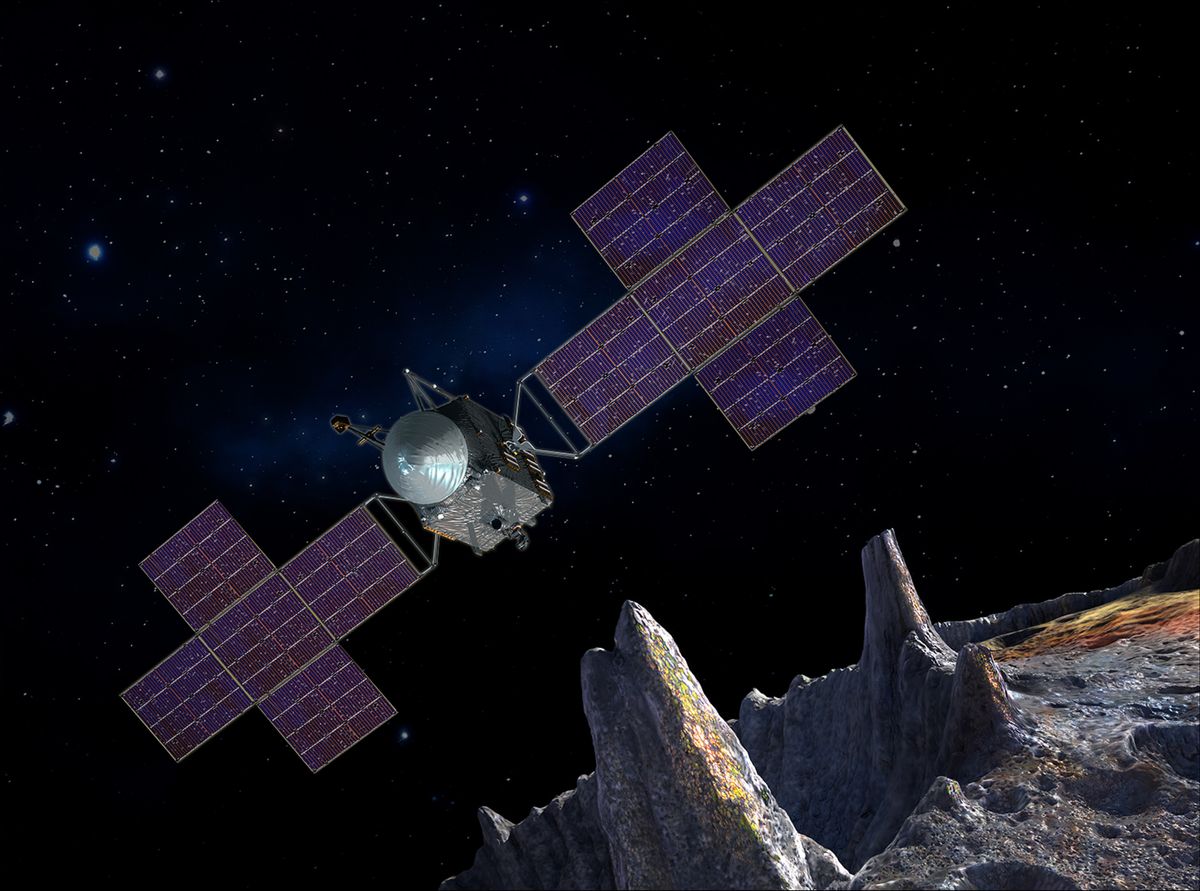A Venus mission should wait no less than three extra years to launch because of issues with one other interplanetary NASA enterprise.
A tangled internet of points led to the delay of the Psyche spacecraft‘s mission to the primary asteroid belt, which was initially set to launch between August and October of this 12 months.
Psyche survived a continuation/termination evaluate this 12 months that might have led to its cancellation and is now anticipated to fly in October 2023. However prices and staffing points related to Psyche’s delay have pushed the launch of one other high-profile NASA mission again by no less than three years, officers with NASA’s Jet Propulsion Laboratory (JPL) in Southern California and the company mentioned.
Associated: The greatest asteroid missions of all time!
VERITAS (“Venus Emissivity, Radio Science, InSAR, Topography and Spectroscopy”) had been focused for liftoff in late 2027, however it would now launch no sooner than 2031. VERITAS will use radar to map Venus‘ floor from orbit in nice element. (One other NASA Venus mission, DAVINCI+, remains to be on monitor for a 2029 launch.)
Whereas glitches with growing the Psyche’s flight software program had been named as the first technical reason behind the JPL-led mission’s delay, an independent investigation launched Friday (Nov. 4) found wider issues (opens in new tab) with administration and staffing that contributed to the issue.
“The evaluate board — convened on the request of NASA and JPL — discovered a big issue within the delay was an imbalance between the workload and the accessible workforce at JPL,” NASA officers mentioned in a statement (opens in new tab) late Friday. “NASA will work intently with JPL administration over the approaching months to deal with the challenges raised within the report. The board will meet once more in spring 2023 to evaluate progress.”
Psyche, which is able to go to its metallic asteroid namesake, will nonetheless want to search out cash to cowl an anticipated growth fund shortfall even after NASA delays the estimated $500 million (opens in new tab) VERITAS, NASA’s Lori Glaze warned whereas talking with reporters in a press convention Friday. The company beforehand famous that the cap for the Psyche mission (together with launch) was $985 million, and $717 million had already been spent by late June (opens in new tab).
“There may be an elevated price to the division funds with the intention to help the event of Psyche,” mentioned Glaze, NASA’s planetary science director. Moreover, NASA decided that delaying VERITAS “would permit skilled employees at JPL to finish growth of strategic flagship missions additional alongside of their growth,” the company assertion mentioned Friday.
Programmatic adjustments to Psyche are coming within the meantime. The investigation board recognized a variety of staffing points, together with (however not restricted to) lack of communication because of hybrid work related to COVID-19 isolation protocols; a speedy changeover in administration (3 times in 4 years); and staff being unable to simply convey ahead points to individuals greater up the mission’s chain of command.
Shortfalls in staffing had been related to two Mars mission failures within the late Nineteen Nineties: the Mars Local weather Orbiter and the Mars Polar Lander, every of which did not attain its vacation spot safely because of technical issues. However this time round, it was much less a staffing challenge and extra an absence of technical oversight, JPL Director Laurie Leshin mentioned throughout Friday’s briefing. The pandemic induced a few of these points, Leshin added.
Associated: The best (and worst) Mars landings of all time
Psyche managers, she mentioned, “had been spending much more time attempting to determine staffing challenges, and that may result in some points in them with the ability to do the technical oversight that we anticipate of them as effectively. In order that, to me, is a very essential thread to tug on right here. It isn’t that we want extra [people]. It is that we have to be sure that individuals perceive their roles and duties and are doing that successfully.”
Leshin emphasised that the Psyche staff would wish to take a look at their processes to “be sure that we’re doing the highest-value issues,” together with discovering the suitable metrics and specializing in innovation. The teachings discovered from this course of, she mentioned, will assist with managing different forthcoming NASA missions like Europa Clipper, poised to launch to an icy moon of Jupiter in 2024.
Evaluate chair Tom Younger, who chaired the investigation of the 2 1998 Mars failures as effectively, emphasised that the circumstances had been totally different by way of staffing between then and now. He described these two failed Mars missions as being “extremely constrained” with their price and schedule, which elevated the chance. With Psyche, he famous, staff did come ahead to say the mission wasn’t prepared: “It takes some braveness to say that you simply’re not able to launch.”
“We actually did not advocate extra center administration or managers,” Younger added. “We actually mentioned that we needed to have managers who had the mandatory expertise to execute a program with the complexity and challenges of Psyche.”
NASA and JPL concurred, or concurred in spirit, with the entire suggestions made by the board and have “already made numerous strikes” to enhance processes for Psyche going ahead, Leshin famous. New management is in place in areas like programs engineering, and new processes are within the works to extend collaboration. The group can also be “redoubling our efforts to verify we’re bringing within the expertise we want” amid an industry-wide employee scarcity, she mentioned, which incorporates measures like reviewing wage compensation and mentorship alternatives.
“We’re working that problem. We’re going through into that problem each day, and we’re doing effectively. We’re in a position to rent nice of us, and we’ll be persevering with to do this,” added Leshin. Positions are open right this moment for anybody who needs to use, she added.
Elizabeth Howell is the co-author of “Why Am I Taller (opens in new tab)?” (ECW Press, 2022; with Canadian astronaut Dave Williams), a ebook about space medication. Comply with her on Twitter @howellspace (opens in new tab). Comply with us on Twitter @Spacedotcom (opens in new tab) or Facebook (opens in new tab).




